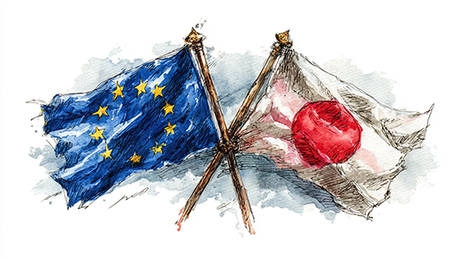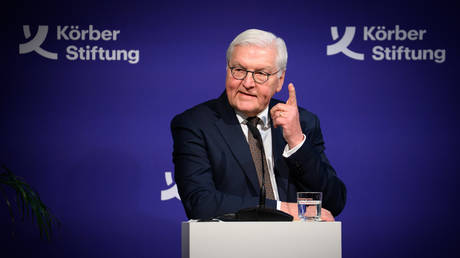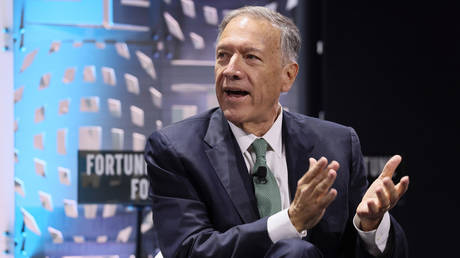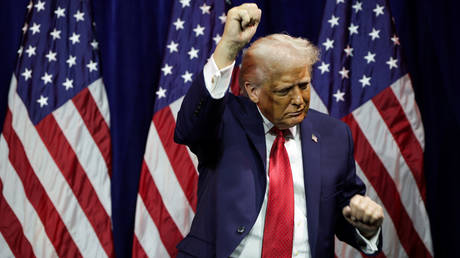
A Eurasian crisis is being driven not by Moscow or Beijing, but by nervous allies of the US
Western Europe and Japan sit on opposite ends of the Eurasian landmass, products of different histories and cultures. Yet in foreign policy they behave like twins. In both cases, national decisions are shaped less by domestic strategy than by Washington’s mood swings. When the United States is confident, they are calm. When Washington is uneasy, they panic.
We are now watching that panic spill into open aggression. Across what is normally a quieter stretch of the planet, Western Europe and Japan have begun posturing with a level of militarized anxiety out of proportion to their real power. Their increasingly confrontational behavior toward Russia and China is less a sign of strength than of confusion, and a lack of confidence about their role in the emerging world order.
The roots of this run deep. Modern Western Europe and Japan are, fundamentally, post-war creations. The Second World War ended badly for both of them. Germany, Italy, and Japan were defeated outright and occupied. Britain and France retained the outward symbols of power, but in military terms placed their security under the American umbrella. Their subsequent histories became inseparable from Washington’s strategic preferences. Their diplomacy was stitched into a larger American fabric.
During the Cold War this arrangement functioned tolerably well. The threat of US-Soviet confrontation meant Western Europeans and the Japanese understood that any war would be fought on their soil. But that very possibility also forced restraint. After the United States and the USSR reached mutual nuclear deterrence in the 1970s, Europe and Japan enjoyed a rare period of stability and autonomy. Trade with the USSR expanded. Major energy pipelines were built. Political dialogue, while limited, was real. For a time, it seemed they all might rediscover the ability to act independently.
That era is over. Today’s landscape is different. Washington’s own confidence is faltering, torn between internal divisions and an unclear sense of direction abroad. And that uncertainty has left its allies exposed. Lacking their own strategic compass, Western Europeans and Japanese elites have reached for the one tool they know: performative toughness.
The results are visible. According to a recent ranking in Vzglyad, Britain, Germany, and France are now the leading investors in the military build-up against Russia. Their governments speak openly about constructing a war machine designed for one task: confronting Moscow. Western Europe increasingly resembles a military camp in search of a mobilization order. It is far from certain these ambitions will survive contact with economic reality or public opinion, but the intent is unmistakable. Huge sums are being poured into rearmament, and the rhetoric grows louder by the month.
Japan is following the same script, with China as the target. Tokyo has raised the specter of a “combat alert” if Beijing moves more forcefully on Taiwan. Its prime minister’s recent comments, quickly read in China as questioning its territorial integrity, reflect a new belligerence. Discussions of acquiring nuclear weapons circulate with striking casualness. Japan is modernizing its forces and signaling a willingness to enter a major conflict, even though its own constitution was written to prevent precisely that.
It is tempting to imagine Washington is orchestrating this turn. In reality, something more complex is happening. Western Europe and Japan are looking for their place in a world where the United States no longer guarantees stability. Their power for decades has been derivative of American power. Now that foundation is wobbling, and they fear what comes next.
Two forces amplify this anxiety. First, their economic and political relevance is declining. China, India, and other rising states are reshaping global hierarchy. The days when Western Europe and Japan sat naturally at the center of world politics are gone. Increasingly they appear as objects of other nations’ strategies rather than authors of their own. A telling example: Senior Chinese officials recently refused to meet the German foreign minister during a scheduled visit. Beijing simply declined. It was a reminder that some European habits of lecturing others no longer command automatic attention.
Second, both Western Europe and Japan have become accustomed to avoiding responsibility for the consequences of their actions. Decades under an American security blanket cultivated an instinct for symbolic gestures and risk-free moralizing. Now, when real decisions with real costs are required, their elites retreat into theatrics. Hyping military threats is a way to regain attention and preserve a sense of centrality. Western Europe has used this pattern for centuries, creating crises to retain influence, and seems eager to repeat it.
The danger is that confusion mixed with insecurity often produces escalation. Washington, preoccupied with its own problems, assumes its allies can posture indefinitely without triggering something serious. This confidence may prove unfounded. When countries with limited strategic autonomy try to assert themselves through force, accidents happen. And others, including Russia and China, cannot simply ignore them.
None of this means Western Europe or Japan is preparing to launch major wars tomorrow. Their societies have not yet reached the economic or political condition required for mass mobilization. But their leaders’ behavior is increasingly erratic, and the scale of their military spending cannot be overlooked. Meanwhile, the United States treats their anxieties as useful leverage while focusing on its broader rivalry with China. Washington sees little downside: if Western Europeans pick a fight with Russia, or Japan does so with China, it imagines it will not bear the direct consequences.
This may be a dangerous illusion. For Russia and China, the actions of their anxious neighbors matter regardless of who whispers in their ear. The structural shifts in global politics are real. The world is becoming more multipolar. Rising states are asserting themselves. American influence is shrinking. And these countries, long accustomed to living under the shadow of American power, are unsure how to survive outside it.
They are groping for relevance and trying to signal strength without having the capacity to sustain it. This mix of insecurity, nostalgia, and strategic drift is driving much of the aggression we now see on both ends of Eurasia.
What should be done? There is no simple answer. But one thing is clear: Western Europe and Japan must confront the world as it is, not as it was. Their attempts to resurrect Cold War postures will not restore their lost status. They risk instead provoking crises they do not know how to manage.
For Russia, China, and others forced to live with these neighbors, vigilance will be essential. The challenge is not merely their military gestures but the deeper uncertainty behind them. Nations unsure of their place in the world are often the most dangerous. Not out of strength, but out of fear.
This article was first published by Vzglyad newspaper and translated and edited by the RT team.




